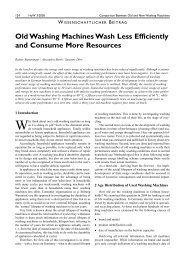Washing-up Behaviour and Techniques in Europe - Institute of ...
Washing-up Behaviour and Techniques in Europe - Institute of ...
Washing-up Behaviour and Techniques in Europe - Institute of ...
Create successful ePaper yourself
Turn your PDF publications into a flip-book with our unique Google optimized e-Paper software.
031_Stamm<strong>in</strong>ger.qxp 27.02.2007 16:26 Seite 33<br />
<strong>Wash<strong>in</strong>g</strong>-<strong>up</strong> behaviour HuW 1/2007 33<br />
Table 2: Region <strong>of</strong> orig<strong>in</strong> <strong>of</strong> test persons <strong>and</strong> where tested<br />
Region<br />
Germany<br />
Great Brita<strong>in</strong>, Irel<strong>and</strong><br />
France<br />
Spa<strong>in</strong>, Portugal<br />
Italy<br />
Turkey<br />
Pol<strong>and</strong>, Czech Rep.<br />
Total<br />
Source: Own data<br />
# <strong>of</strong> test persons<br />
11<br />
27<br />
18<br />
20<br />
15<br />
11<br />
11<br />
113<br />
way <strong>of</strong> sav<strong>in</strong>g time, <strong>and</strong> they preferred automatic dishwash<strong>in</strong>g<br />
for performance <strong>and</strong> ecological reasons (Table 4).<br />
In reference to the question about how <strong>of</strong>ten they wash<br />
their dishes by h<strong>and</strong>, 50 % <strong>of</strong> our volunteers said they do so<br />
before or after each meal, while the other 50 % said they<br />
washed <strong>up</strong> twice a day at most. This shows clearly that there<br />
are two different attitudes: some people want to have an<br />
Table 3: Reasons for not own<strong>in</strong>g a dishwasher *<br />
Reasons for not own<strong>in</strong>g a dishwasher<br />
W ISSENSCHAFTLICHER B EITRAG<br />
here<strong>of</strong> tested<br />
dur<strong>in</strong>g excursions<br />
20<br />
10<br />
6<br />
6<br />
–<br />
–<br />
Too few people <strong>in</strong> household<br />
Dishwasher is too expensive<br />
Hard soils can only be removed by manual wash<strong>in</strong>g<br />
Manual wash<strong>in</strong>g is more economical <strong>in</strong> water <strong>and</strong> energy<br />
consumption<br />
Source: Own data<br />
* 74 people not own<strong>in</strong>g a dishwasher<br />
Table 4: Reasons for own<strong>in</strong>g a dishwasher *<br />
Reasons for own<strong>in</strong>g an automatic dishwasher<br />
Many people <strong>in</strong> household<br />
Dishwashers save valuable time<br />
Dishwashers produce better <strong>and</strong> more hygienic results<br />
Automatic dishwash<strong>in</strong>g saves water <strong>and</strong> energy<br />
Source: Own data<br />
* 39 people own<strong>in</strong>g a dishwasher<br />
empty s<strong>in</strong>k, so they wash <strong>up</strong> whenever there are items to be<br />
washed, <strong>and</strong> other people pile the used dishes <strong>up</strong> until there<br />
is time to wash <strong>up</strong>.<br />
Accord<strong>in</strong>g to the answers from the questionnaire, roughly<br />
30 % <strong>of</strong> our participants do their wash<strong>in</strong>g-<strong>up</strong> only under<br />
cont<strong>in</strong>uously runn<strong>in</strong>g tap water. The rest usually washed<br />
their dishes <strong>in</strong> a water bath (s<strong>in</strong>k or bowl), <strong>and</strong> they gave<br />
different reasons for replac<strong>in</strong>g the water (Table 5). Surpris<strong>in</strong>gly,<br />
the amount <strong>of</strong> foam is <strong>of</strong> m<strong>in</strong>or importance <strong>in</strong> the<br />
decision to replace the water. Almost 30 % <strong>of</strong> our volunteers<br />
said they do not give washed items a f<strong>in</strong>al r<strong>in</strong>se with fresh<br />
water. Of those who do (multiple answers possible), about<br />
80 % use a f<strong>in</strong>al r<strong>in</strong>se ma<strong>in</strong>ly to remove rema<strong>in</strong><strong>in</strong>g soil particles,<br />
<strong>and</strong> 50 % do so to remove foam (or chemicals). With<br />
regard to the order <strong>in</strong> which items are washed, answers produced<br />
a clear rank<strong>in</strong>g (Table 6), where the first (glasses) <strong>and</strong><br />
last (pots <strong>and</strong> pans) types <strong>of</strong> items to be washed have clearer<br />
prom<strong>in</strong>ence than the rest. As for wash<strong>in</strong>g-<strong>up</strong> tools, no<br />
clear preference became evident; sponges are used ma<strong>in</strong>ly,<br />
but brushes <strong>and</strong> towels seem to be widely used as well.<br />
From a list <strong>of</strong> problems <strong>and</strong> disadvantages <strong>of</strong> wash<strong>in</strong>g <strong>up</strong><br />
by h<strong>and</strong>, our participants agreed ma<strong>in</strong>ly to ergonomic <strong>and</strong><br />
performance-related arguments (Table 7) aga<strong>in</strong>st manual<br />
dish wash<strong>in</strong>g.<br />
Range <strong>of</strong> agreement to statement (multiple answers allowed)<br />
Important <strong>and</strong> very<br />
important<br />
45%<br />
45%<br />
32%<br />
24%<br />
Important <strong>and</strong> very<br />
important<br />
46 %<br />
74 %<br />
33 %<br />
41 %<br />
Less important or<br />
less unimportant or<br />
no statement<br />
28%<br />
30%<br />
42%<br />
46%<br />
Less important or<br />
less unimportant or<br />
no statement<br />
33 %<br />
23 %<br />
41 %<br />
46 %<br />
Unimportant <strong>and</strong><br />
absolutely<br />
unimportant<br />
27%<br />
26%<br />
26%<br />
30%<br />
Range <strong>of</strong> agreement to statement (multiple answers allowed)<br />
Unimportant <strong>and</strong><br />
absolutely<br />
unimportant<br />
21 %<br />
3 %<br />
26 %<br />
13 %





